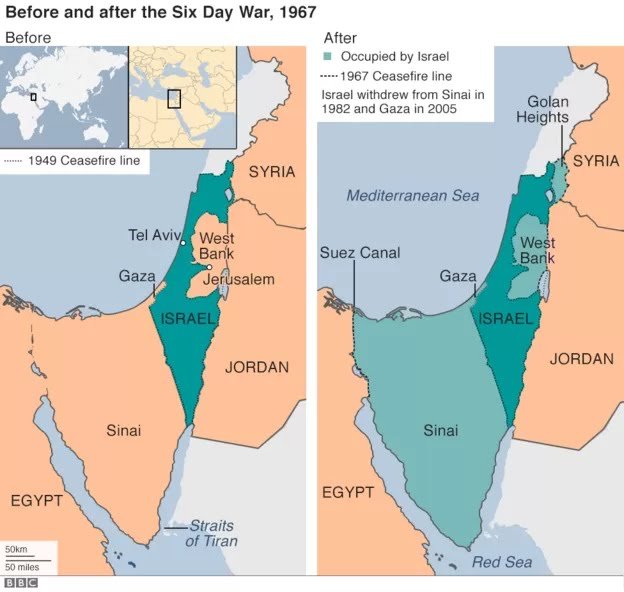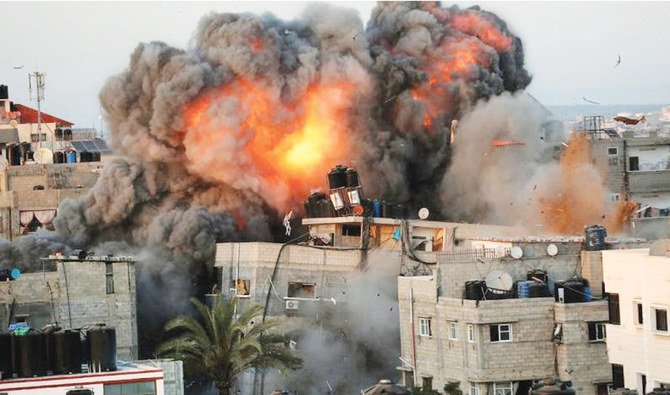
Image made on canva
Greetings to everyone, I'm happy to be making a debut on this community with this article of mine about the six day war. Its my pleasure doing this.
Introduction
Today, I'll be writing about the six day war between Israel and the Arab states of Egypt, Jordan and Syria, and the rationale that lead to an Israeli victory, defeating a military structure three times their own.
The 1967 war between Israel and the Arab states, popularly known as the six day war was a short and bloody war that shaped the map of the entire middle east.
Origin of the war
After series of accusations and counter accusations between Israel and its Arab neighbours, bordering on boundary dispute and diplomatic frictions, the Israeli forces launched a preemptive airstrikes that crippled the Egyptian air force system as well as her allies, Jordan and Syria. This later lead to a fierce ground combat on three different fronts that lasted for 6days, all in a bid to capture the sinai Penisula and Gaza from Egypt. They did finally achieved their goal on the sixth day before a ceasefire was subsequently brokered by the United nation.
Mideast tension escalate
The six day war began following worsening tensions around the middle east between Israel and Egypt. In April 1967, the soviet union provided Egypt with a false intelligent report that Israel were planning a full scale invasion of Syria by moving their troops to the northern border, the information was however inaccurate. This made the Egyptian president Gamal Abdel Nasser to swing into action. In a bid to rally support for her neighbour, he ordered the Egyptian troops into the Sinai Penisula region to expel the peacekeeping force of UN and the Israeli forces that have been guarding the region for over a decade.
As days went by, the situation deteriorated further, the Egyptian president also banned Israeli shipping from the straits of Tiran, the sea connecting the red sea and golf of Aqaba.
The war erupts
On the 5th day of June, 1967, the Israeli defence counsel initiated Operation focus, this squad made a coordinated aerial attack on the Egyptian, Jordan and Syrian air systems on the morning. About 18 different airfields and 90% of Egyptian airforce were brought to the ground. This attack took the Egyptians by surprise, and by the close of the day, the Israeli forces had won total control of the skies. Fierce ground combat began on three fronts and lasted for some days before the seizure of the penisula region by Israeli forces.
The Egyptian army put up a spirited and dogged resistance, but this soon fell over when Field marshal Abdel Hakim Amer ordered a general retreat of the Egyptian forces due to the heavy casualties encountered. On the fifth day of the war, the Israli forces captured the whole of Jerusalem and prayed there to celebrate their victory. The united nation brokered a ceasefire on the six day and the war came to an end. It was later estimated that about 20,000 Arab forces and 800 Israeli forces had died as a result if the conflict in just 132 hours of fight.
The rationale that lead to an Israeli victory
It was on record that Israel had only about 800 tanks, 150 aircrafts and 50,000 troops as against the 250,000 troops, 850 tanks and 600 aircrafts owned by The Egyptian, Jordan and Syrian federation respectively. The question is, how were they able to secure victory in such an outnumbered war.
They used the preemptive assault strategy that took their neighbours by surprise, giving them little time to recuperate, hence crippling their air force system, the most important assets during wars. This made Israelis took total control of the airways, making it difficult for the Egyptians to have their space since the most important arsenal, the airstrike systems were destroyed.
Conclusion
Generally, conflicts are not good as they tend to bring environmental and emotional damage to a country. The six day war created hundreds of refugee and thousands of IDPs. It also retarded the economic growth of the region.
Dialogue should always be the only alternative when conflicts arise so as to avert the irredeemable damages occasioned by wars.


